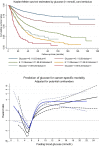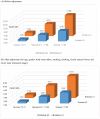Interaction between fasting blood glucose and tumor embolus in predicting the postoperative prognosis of 4330 Chinese patients with gastrointestinal tract cancer
- PMID: 31949490
- PMCID: PMC6959014
- DOI: 10.7150/jca.34843
Interaction between fasting blood glucose and tumor embolus in predicting the postoperative prognosis of 4330 Chinese patients with gastrointestinal tract cancer
Abstract
Objectives: We aimed to investigate the interaction between fasting blood glucose and tumor embolus, and the potential mediation effect of fasting blood glucose on tumor embolus in predicting gastrointestinal tract cancer-specific mortality risk postoperatively. Methods and Results: 4330 patients were consecutively recruited between January 2000 and December 2010, with annual follow-up ending in December 2015. The median follow-up time was 48.6 months. Two optimal cutoff points for fasting blood glucose (6.11 and 11.69 mmol/L) were identified. Patients with fasting blood glucose <6.11 mmol/L and negative tumor embolus had the best survival, and the worst survival was seen in patients with fasting blood glucose >11.69 mmol/L and positive tumor embolus. The risk was highest for patients with fasting blood glucose >11.69 mmol/L and positive tumor embolus (adjusted HR: 11.91, 95% CI: 9.13 to 15.52). Using the Sobel-Goodman mediation test, the proportion of total effect conferred by tumor embolus that was mediated by fasting blood glucose was estimated to be 45.3%. Conclusions: Our findings indicate a synergistic interaction between fasting blood glucose and tumor embolus in predicting the postoperative prognosis of gastrointestinal tract cancer.
Keywords: fasting blood glucose; gastrointestinal tract cancer; interaction; mortality; prognosis; tumor embolus.
© The author(s).
Conflict of interest statement
Competing Interests: The authors have declared that no competing interest exists.
Figures


References
-
- Peleteiro B, Barros S, Castro C, Ferro A, Morais S, Lunet N. Worldwide burden of gastric cancer in 2010 attributable to high sodium intake in 1990 and predicted attributable burden for 2030 based on exposures in 2010. Br J Nutr. 2016;116:728–33. - PubMed
-
- Chen W, Zheng R, Baade PD, Zhang S, Zeng H, Bray F. et al. Cancer statistics in China, 2015. CA Cancer J Clin. 2016;66:115–32. - PubMed
-
- Vassos N, Piso P. Metastatic Colorectal Cancer to the Peritoneum: Current Treatment Options. Curr Treat Options Oncol. 2018;19:49. - PubMed
-
- Coburn N, Cosby R, Klein L, Knight G, Malthaner R, Mamazza J. et al. Staging and surgical approaches in gastric cancer: A systematic review. Cancer Treat Rev. 2018;63:104–15. - PubMed
LinkOut - more resources
Full Text Sources

